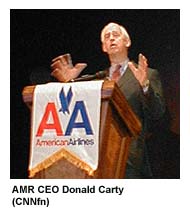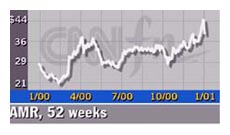|
AMR takes TWA aboard
|
 |
January 10, 2001: 6:04 p.m. ET
AMR also to acquire $1.5B of US Airways assets, 49 percent stake in DC Air
By Staff Writers Tom Johnson and Kim Khan
|
NEW YORK (CNNfn) - American Airlines parent AMR Corp. unveiled several widely-expected acquisitions Wednesday, including an agreement to purchase most of the financially troubled Trans World Airlines Inc. assets for about $500 million cash. TWA, one of the oldest carriers in the United States, filed for bankruptcy as part of the arrangement.
In separate arrangements, AMR (AMR: Research, Estimates) also agreed to acquire certain assets from US Airways for approximately $1.2 billion, and to purchase a 49 percent stake in the start-up DC Air for approximately $82 million.
|

|
VIDEO
|
|
 TWA bankruptcy sets stage for American buyout. TWA bankruptcy sets stage for American buyout. |
|
Real
|
28K
|
80K
|
|
Windows Media
|
28K
|
80K
|
|
Those deals, if approved, are designed to ease regulatory concerns that have thus far stalled UAL Corp.'s $4.3 billion planned purchase of US Airways (U: Research, Estimates), and will effectively create two dominant airlines in the U.S. air travel industry in UAL (UAL: Research, Estimates), the parent company of United Airlines, and American, currently the No. 2 U.S. carrier.
But the transactions have already sparked strong opposition from some regulators and consumer groups concerned about rapid industry consolidation and the possibility of higher air fares for consumers -- setting the stage for a vigorous regulatory review on Capitol Hill.
"Losing competitors in this highly-concentrated industry is disastrous," said Mark Cooper, research director for the Consumer Federation of America, one of several consumer groups already on record opposing the transactions.
"We've gotten to the point where the number of national carriers is so small, it's impossible to have competition," he said.
The expected opposition to the agreements announced Wednesday helped push shares of AMR down for the third consecutive day. AMR shares closed down 25 cents to $38.69, although that was well above the stock's lows of the day.
Some analysts, however, expressed optimism that the transactions would be approved.
"The original US Airways/United proposal was almost dead on arrival," said Ray Neidl, an airline analyst with ING Barings. "I don't think regulators would have ever approved that. But by allowing a powerful company like American to come into many Eastern markets ... I think that will make regulators feel a little better."
So who's next? See what analysts are saying about Delta Airlines' future
Renewed optimism about the United/US Airways union helped push US Airways up $1.69 to $44.38 in mid-afternoon trading, while UAL shares shed 13 cents to $41.88.
AMR Chairman and CEO Donald Carty Wednesday expressed few concerns about the expected opposition to the deals, stressing that he believes competition in the airline industry will remain vigorous even after the transactions are completed. He said if the review and bankruptcy approval processes run smoothly, the transactions could be completed by late April.
"This is an enormously competitive business, including intense competition between American and United," Carty told CNNfn. "What these deals this week represent, however, is an attempt to deal with that issue. By United divesting themselves of some of the assets that are of concern to the Justice Department and other regulators, I think they've gone a long way to curing the kinds of concerns that [have been] raised.
 "The TWA transaction is quite different. TWA is one way or another going to disappear as a corporate entity. So what we're doing by acquiring TWA is simply preserving 21,000 jobs and a very important and vital hub operation in St. Louis," Carty said. "The TWA transaction is quite different. TWA is one way or another going to disappear as a corporate entity. So what we're doing by acquiring TWA is simply preserving 21,000 jobs and a very important and vital hub operation in St. Louis," Carty said.
"Even though we may be large and United may be large, this is a very competitive business," agreed Bill Compton, TWA's president and chief executive. "Maybe there are two big ones [now], but there is plenty of competition. The American consumer has nothing but positives coming out of this because what we bring is hopefully some stability and growth to this part of the country."
Indeed, the TWA transaction will provide American with a critical new connection hub in St. Louis, significantly bolstering its position as an east/west carrier.
"I think they looked at this in terms of making a response to the United/US Airways deal," said Robert Milmore, airline analyst with Arnold and S. Bleichroeder. "I think they deserve credit for creativity announcing this."
Terms of the transaction call for AMR to pay approximately $500 million for about 190 TWA aircraft, 175 gates, and 173 slots across the country. TWA, the No. 8 carrier in the United States, operates some 800 daily flights.
AMR also has agreed to provide TWA with $200 million of debtor in possession financing, which is subject to approval from the bankruptcy court.
This marks the third time cash-strapped TWA has filed for bankruptcy protection. American, the second-biggest U.S. carrier after United Airlines, said it will offer jobs to nearly all of TWA's 20,000 employees.
 Still, some analysts believed that by going through bankruptcy court, which allows AMR to obtain more favorable financing on the company's outstanding loans and debt, the possibility exists that TWA assets could be poached by other carriers. Still, some analysts believed that by going through bankruptcy court, which allows AMR to obtain more favorable financing on the company's outstanding loans and debt, the possibility exists that TWA assets could be poached by other carriers.
"If another bidder comes in the stakes could be raised on TWA to where AMR doesn't think it's worth it," Milmore said.
But Carty countered that while that risk existed, he believed TWA's creditors would find AMR's proposal more than fair. (646K WAV) (646K AIF)
Carty said in a conference call AMR has the right to match or make the last offer on any competing bid. That provision must be approved by a bankruptcy court, but Carty said the provision must be in position for the deal to go through. The agreement with TWA carries a $75 million break-up fee.
"Probably the TWA system fits in a little bit better with the American system than it would with many other airlines," Neidl said. "There could be some other bids that develop, but right now that's only a 50-50 chance at most."
A strong presence in Washington
The deal with United calls for AMR to buy up to 86 aircraft and 36 airport slots from UAL, as well as assuming approximately $300 million in aircraft leases. The assets were to be part of UAL's planned purchase of US Airways (U: Research, Estimates), which also has caused concern among regulators.
American will get slots in key airports such as New York's La Guardia, Boston's Logan and Washington's Reagan National and boost its already strong position at New York's John F. Kennedy.
Read a transcript of CNNfn's Susan Lisovicz's chat on the airline merger
The agreement with DC Air, a new airline led by Black Entertainment Television Chairman Robert Johnson, includes an exclusive marketing agreement that will permit DC Air passengers to participate in American's frequently flyer program.
The deals, if completed, would give United and American each about a quarter of the domestic airline market. American would grow by about 20 percent, greatly increasing its presence in busy East Coast cities including New York and Washington.
TWA lost $115 million in the first three quarters of 2000 after losing $353 million in 1999, making it the only major airline not to show a profit last year.
American officials said they expect the three acquisitions to slightly dilute its earnings in the first year following closure, then add to its earnings after that.
Bush administration to take lenient stance?
The Clinton administration has resisted airline mergers in recent years. Although the incoming Bush administration is expected to take a somewhat more lenient stance, many still expect a stiff fight for the latest deal on Capitol Hill.
"I don't prejudge this administration," Cooper said. "I don't assume they are going to be worse [about protecting consumer interests]. If we can convince Republicans to be pro-competitive, then we can make some real progress here."
Cooper said if the transactions announced Wednesday are ultimately permitted to go through, he believed Congress would once again need to consider bringing the airline industry back under a government-related structure to keep consumer fares and satisfaction at reasonable levels.
"The answer they have given us is competition cannot protect the public," he said. "So we believe that Congress should propose new rules that protect the public. If they are going to have a managed cartel, then the public interest should be at the table and right now, they are not."
Travels agent groups likewise expressed their concerns Wednesday. The American Society of Travel Agents Wednesday called American's purchase of TWA the latest example of "unchecked airline arrogance and blatant disregard for the principles of competition."
The ASTA said less competition in the airline industry will translate into higher prices, decreased customer service and the likelihood of serious service disruptions.
But Carty said at a press conference competition would remain stiff, the widening of networks will result in more consumer choices, and price competition in the business will always be strong.
"You may have fewer total number of airlines, but you have airlines who are more competitive because they are covering a network over the entire country," Carty said.
One bright spot for the airlines so far is that TWA and American Airlines labor unions appear at least initially comfortable with the transactions.
Robert Roach, general vice president of the International Association of Machinists, which represents 16,000 TWA employees, said management informed him American will protect the jobs of substantially all of TWA's employees.
However, a spokesman for the Allied Pilots Association, which represents American pilots, said the company has yet to contact that union's management to provide any information about the deal.
"Labor is always a big issues and the pilots union is one of the toughest unions to integrate," Milmore said. "There's a lot of moving pieces and a lot of questions in this deal."
Taken together, the transactions will close the book on TWA, an airline whose roots date to the 1925 founding of Western Air Express.
The carrier catered to popes and movies stars, once ruled skies around the world with Pan Am, and held the world in rapt attention during a 1985 hijacking and the 1996 crash of a flight from New York to Paris. But stung by rising fuel prices and a corporate restructuring that never caught hold, the company has not turned an annual profit since 1988. 
|
|
|
|
|
 |

|

